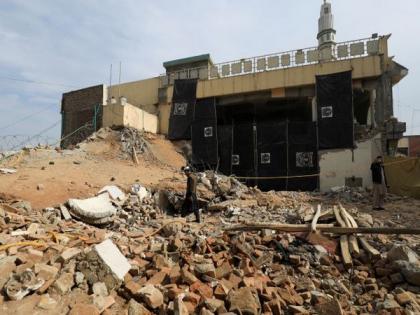Pakistan's economic troubles intertwined with inconsistent treatment of terrorists
By ANI | Updated: March 6, 2023 17:55 IST2023-03-06T12:22:45+5:302023-03-06T17:55:07+5:30
Pakistan's economic troubles are intertwined with its inconsistent treatment of terrorists, writes Husain Haqqani, a senior fellow and Director ...

Pakistan's economic troubles intertwined with inconsistent treatment of terrorists
Pakistan's economic troubles are intertwined with its inconsistent treatment of terrorists, writes Husain Haqqani, a senior fellow and Director for South and Central Asia at the Hudson Institute, in Foreign Policy.
For decades, Pakistan has allowed some terrorist groups to operate freely while cracking down on others. Terrorism and foreign sanctions resulting from terrorist financing have made it difficult for Pakistan to attract investment.
Moreover, sympathy for jihadis among the public and within law enforcement and intelligence, along with inaction by members of the political class, has allowed domestic terrorist groups to operate with some impunity, reported Foreign Policy.
Islamist and sectarian groups first launched attacks inside Pakistan in the early 1990s, following the end of the Soviet-Afghan War. After the success of the Afghan mujahideen in driving out the Soviets--with US support--Pakistan's security services mobilized similar ideologically motivated groups to try to force India out of Kashmir. Pakistani jihadists fought in the Afghanistan civil war that followed the Soviet-backed regime's collapse from 1992 to 1996, and later alongside the Taliban beginning in 2001. (Pakistan supported the Afghan Taliban regime in the 1990s).
Islamabad must change its tack if it hopes to prevent a full-blown insurgency and recover its global standing, said Haqqani.
Islamist groups recruiting in Pakistan cited hadith--traditions and sayings attributed to the prophet Mohammed--that prophesied a great battle in the Indian subcontinent.
Pakistan's security services expected that radicalization through religion could help break the deadlock over Kashmir and empower Pakistan's allies in Afghanistan. The strategy instead made Pakistan a battleground of competing interpretations of radical Islamist ideas, said Haqqani.
In the last 30 years, Pakistan has supported some jihadi groups and tolerated others, while also participating in the United States-led war against terrorism.
This juggling act has eroded Pakistan's international standing and led some jihadi factions to target Pakistan's military and security forces, occasionally inviting retaliation.
January 30 suicide bombing at a mosque in Peshawar is a case in point resulting in the death of 101 worshippers, most of them policemen.
At the same time, Pakistan is facing violence from Tehrik-e-Taliban Pakistan (TTP), an offshoot of the Afghan Taliban movement that is ideologically aligned with the Afghan branch but draws its leaders from within Pakistan, reported Foreign Policy.
The TTP has claimed responsibility for many attacks in the latest spate of terrorism in Pakistan; a TTP splinter group said it had carried out the January mosque attack. The group seeks to overthrow Pakistan's government and create an Islamic emirate.
Pakistan's security services and some politicians, including former PM Imran Khan, have advocated a nuanced approach to the TTP and other terrorist groups, suggesting the groups reflect Islamic aspirations that need not be seen as inimical to Pakistan.
But events have repeatedly proven that compromise with armed and violent radical Islamist groups is impossible, said Haqqani.
Years of contradictory policies have undermined Pakistan's ability to tackle the challenges of Islamist militancy.
More than 8,000 members of Pakistan's security forces have lost their lives in terrorist incidents since 2000. In 2014, the TTP attacked Peshawar's Army Public School, killing 141 people, including 132 children of military officers and soldiers.
The January 30 attack targeted policemen. Both attacks appeared intended to demoralize the Pakistani military and law enforcement and to dissuade Pakistan's leaders from going to battle with the TTP, reported Foreign Policy.
Meanwhile, domestic terrorism has adversely affected the country's economy, which is now mired in crisis. Pakistan's Ministry of Finance estimates the country has lost USD 123 billion in direct and indirect costs due to terrorism.
Many foreigners no longer want to travel to Pakistan, which directly affects tourism and exports. Pakistan's large troop presence along the Afghan border with Afghanistan, occasional military operations, and intelligence operations have all added to the defence budget.
Falling foreign direct investment and foreign sanctions over terrorist financing and money laundering have also taken an economic toll, said Haqqani.
( With inputs from ANI )
Disclaimer: This post has been auto-published from an agency feed without any modifications to the text and has not been reviewed by an editor
Open in app